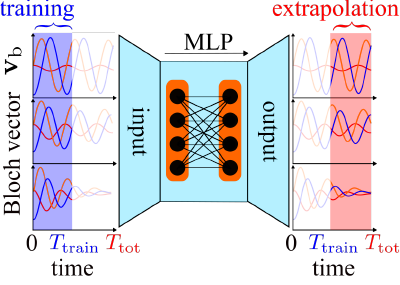Machine learning dynamics of quantum systems
- 05 May 2021
- Tübingen
- Autonomous Learning
Researchers at the University of Tübingen and MPI-IS have applied machine learning methods to understand the quantum dynamics in physical models.
Advances in the development of quantum computing devices have great technological potential. However, quantum effects typically only manifest in systems that are well-isolated from the outside world, and this poses a major obstacle. To faithfully capture and harness quantum effects, knowledge of the quantum state of the system and its environment is required.
In collaboration with Dr. Paolo Mazza, Dr. Federico Carollo, Prof. Sabine Andergassen and Prof. Igor Lesanovsky from the Institute for Theoretical Physics at the University of Tübingen, Dr. Georg Martius, head of the Autonomous Learning Group at the Max Planck Institute for Intelligent Systems, and Dominik Zietlow from his team applied machine learning methods to understand the quantum dynamics in physical models inspired by recent experiments. Their results were recently published in Physical Review Research. In their paper “Machine Learning Time-Local Generators of Open Quantum Dynamics”, the researchers show that the quantum dynamics in these models can be learned even in the presence of strong coupling between the system and the environment. In particular, the knowledge acquired during a short evolution interval makes it possible to extrapolate the dynamics to previously unseen times. This may constitute a route for analyzing long-time behavior in situations where this is not accessible by numerical simulations or experiments. In regimes, where the dynamics cannot be described by such an approach, neural networks can nevertheless be utilized to quantify and characterize the system-environment coupling, which can feed into the development of numerical models and simulation algorithms.
The study, which was funded by the Cluster of Excellence “Machine Learning: New Perspectives for the Sciences” at University of Tübingen, demonstrates how machine learning methods can be applied to physically relevant problems such as the dynamics of quantum systems. This represents a previously unexplored direction in the application of machine learning methods to timely questions in quantum physics, with possible perspectives for other fields as well.
Maschinelles Lernen
Quantensysteme
Quantencomputer
People


